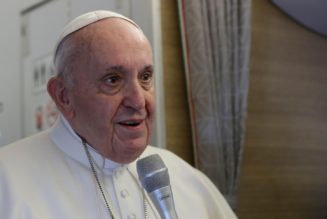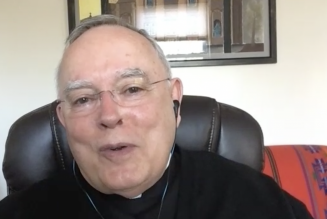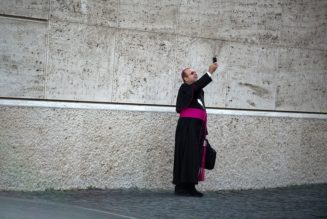
Not that long ago, Vatican documents that miss the mark would have angered me. Now, I see them more as tragic events. Such is the case with Fiducia Supplicans, a Declaration recently issued by the Dicastery for the Doctrine of Faith. The document’s supposed aim was to clarify contested issues and heal rifts in the Catholic communion. It failed in both regards. How the laity and clergy have received the document around the world is a bad omen for how we handle divisive issues in the Catholic Church, issues that have broken up other churches.
Theologically, Fiducia Supplicans is not a great piece of work or writing. Doctrinally, it stands on frail foundations; its biblical and traditional reference points are weak. This may be because the ordinary assembly (Feria IV) of the dicastery was apparently not involved in the formulation and approval of the document, which is highly unusual for a document claiming the rank of Declaration. The text appears to be the brainchild of Cardinal Fernandez, the dicastery’s new prefect, together with a small group of experts and staff. Involving the ordinary members, cardinals, and bishops of the dicastery might have delayed the document’s publication, but it would have certainly contributed to its doctrinal clarity, its theological quality, and its more fruitful reception in and outside the Church. Moreover, this more elitist way of operating stands in curious contrast to the culture of synodality championed by the Roman curia. A more synodal process would have better served the Holy Father, whose authority has not been exactly strengthened by the whole affair.
But these issues are secondary compared to what is most deeply at stake: the Church’s clarity about the sacrament of marriage and what it confers, means, and demands—the monogamous, lifelong relationship of love and fidelity between husband and wife willing to accept the blessing of children. This is revealed at the beginning of the Old Testament and fully brought to light by Christ himself in the gospel and in other New Testament books. This doctrine has been received and developed alongside the Church’s sacred tradition.
The Declaration proposes a broader understanding of blessings, drawing a distinction between liturgical blessings and spontaneous blessings. The distinction is a hierarchical one, in the sense that liturgical blessings appear to be of a higher order, both in what they demand and in what they bestow. Such a distinction is not immediately convincing. Ultimately, the document’s attempt to distinguish between blessing a couple and blessing a union fails, logically, theologically, and pastorally. This failure includes the strained, inappropriate analogy the document construes between same-sex and unmarried couples.
Fiducia Supplicans also suffers from an unfortunate, even woeful, misunderstanding of how other forms of cohabitation relate to holy matrimony and salvation. Its intention seems to be to find new ways, even a whole new attitude, for the Church to accommodate people who find themselves in such relationships. But whether its solution is as promising as it claims to be must be open to debate, as it is mostly a pastoral question, for which universal norms are impossible to formulate. The proof, as it were, is in the pudding. The document will be judged according to its works, to be observed in those who are directly affected and in the larger Christian community. How will the Holy See intervene when even the wide limits drawn by this Declaration are violated?
Furthermore, Fiducia Supplicans seems to have been elaborated without sufficient attention to its impact on a number of particular churches, specifically the growing and vibrant churches in Africa, in which the general attitude toward non-marital (or even same-sex) cohabitation is different from the culture dominant today in most of Europe and America. These churches still find themselves at the margins of the Vatican’s attention and care. African believers and clergy continue to be treated with condescension and paternalism by those influenced by theologies exported from Europe and America, including much of “liberation” theology. This lack of awareness and respect is particularly grave when displayed by German theologians who otherwise parade their supposed cultural consciousness. I presume neither the pope nor his doctrinal équipe are happy with the tactics employed by (mostly European) bishops who declare themselves validated by this document and keep pushing for para-liturgical blessings, thus undermining one of its key intentions.
Behind these problems of content and style, of matter and form, is the document’s self-declared intention to formulize a practice of blessings based on the pope’s own “pastoral vision.” No one doubts the Holy Father’s commitment and competency in this area. I remain unconvinced, however, that it is a good idea for the papacy to expand its area of formal authority beyond doctrine and discipline, and to claim, in addition to the primacy of teaching and jurisdiction, a new “pastoral primacy” that will likely result in a centralism not conducive to fruitful pastoral ministry in the many diverse, and at times strained, contexts in which it is exercised around the world. This ministry, especially if it has evangelization as its goal, must be about reconciliation, liberation, and formation in the deepest sense, and thus about conversion—a concept strikingly unimportant in Fiducia Supplicans. In turn, the document, as it is written, and as it is received, is not a sign of conversion in the Church itself but ends up attempting to square the circle, to create types of blessings for all forms of pseudo-matrimonial, and in many cases sexual, relationships that exist in postmodern societies. No wonder it has been welcomed, generally, as a “first step” by bishops who are stuck in an institutional world of past Christendom, but who are unwilling to recognize the signs of the times: We need new conversions, inside and outside of the Church. That is, after all, what the word “evangelization” means.
The Declaration was issued by the Holy Office, which, especially under its new prefect, de facto has again become the “supreme” dicastery it always was and should be. That development gives me hope for the Roman curia as a whole. But in the exercise of its particular mission, the doctrinal dicastery has to take into account two responsibilities: Its documents need to be clear; and they must resolve uncertainties, not create them. To do so, the dicastery cannot be content with formulations that can somehow, through twists and turns, be reconciled with Catholic doctrine. They must ensure that their declarations are hard to manipulate (for example, by mass media) and are easy to understand for the people of God, starting with the bishops and clergy.
The ongoing attempt, by some theologians and bishops, to explain how the blessing of a couple is not the blessing of their union by claiming that it is a “new” kind of blessing is not tenable. Catholic theologians, not only in Germany, need to take a hard look at themselves and ask what they have contributed to the life and mission of the Church over the last one hundred years. Theologians need to remember, penitently, that the foundations they stand on are the same ones that the Church’s faith, doctrine, and discipline stand on: Scripture and tradition. Neither the magisterium nor pastoral practice, experience, or inclinations are additional sources of divine truth. And pastoral theology from above does not become more convincing if its proposals are declared expressions of popular piety, which is in itself a somewhat authoritarian move.
Pastoral theology in particular, even if handed out by bishops or by the Holy See, needs to be informed, shaped, and at times purified by the light of the gospel. Extending papal authority into the realm of pastoral action is problematic for two reasons: Grounding doctrinal declarations (solely, or mostly) on the pastoral vision of an individual, even a pope, relegates the authority of divine revelation to a strangely marginal place; moreover, pastoral action, while grounded in the common faith, is personal, and thus particular, on both ends—adopted by an individual pastor, and concerned with the salvation of an individual (or a smaller group). In other words, pastoral action (and pastoral theology) must by necessity be diverse, as it can take many forms in different contexts, and it must have doctrinal fidelity at its center. Otherwise, we are looking at doctrinal corruption and pastoral ideology in the Church. At the very least, any bishop who declares that all priests are somehow obliged to confer the blessings deemed possible in Fiducia Supplicans, and any clergy who bestow such blessings in a massively publicized manner, will need to be corrected soon, and are generally not suited for ministry in this area.
I am not convinced Fiducia Supplicans will be a great help for pastoral ministry on the ground. It is impossible to formulize blessings that by their nature are to be informal and spontaneous. Unless the Holy See takes concrete measures now against those who go beyond the limits established by Fiducia Supplicans, it will lose credibility and authority. Clearly, we cannot just brush away all its critics as either intellectually inferior or ill-willed. Instead, a substantial retraction of the text seems theologically more honest and pastorally more promising than endless attempts to justify it.
“Holding to the truth,” we “hand on the catholic and apostolic faith.” Therefore, “doctrinal development” does not mean legitimizing our own theological, pastoral, or evangelistic projects. John Henry Newman argued that Christian doctrine can develop while remaining faithful to divine revelation. Turning the concept around, to make it a tool for what “we” (even synods, popes, or councils) are able to adjust and update transposes the concept to a whole different level. The perplexities of the contemporary world are many, tensions in our Church are running high, and we must resist the temptation of doctrinal obfuscation. Scripture and tradition are what inspire and guide our pastoral and theological endeavors. Every parish, every diocese, and every office at the Holy See is called to model this attitude. Only in this way can we deepen our own conversion, and thus our fidelity to the revealed faith, and foster the commitment of Catholics worldwide to Christ’s commission to make disciples, baptize, and teach.
Msgr. Hans Feichtinger is the pastor of St. George’s Parish and St. Albertus’s Parish in Ottawa.
First Things depends on its subscribers and supporters. Join the conversation and make a contribution today.
Click here to make a donation.
Click here to subscribe to First Things.
Photo by Chabe01 via Creative Commons. Image cropped.
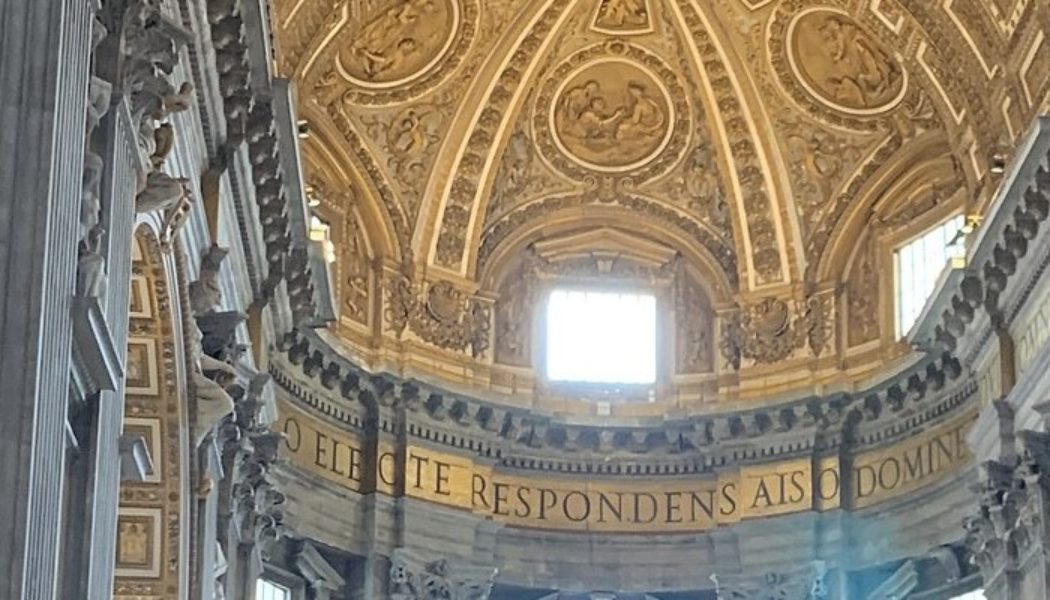


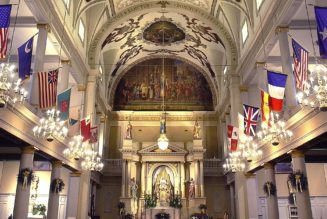
![The First Afterlife of Pope Benedict XVI [New York Times Paywall]…](https://salvationprosperity.net/wp-content/uploads/2023/01/the-first-afterlife-of-pope-benedict-xvi-new-york-times-paywall-327x219.jpg)
